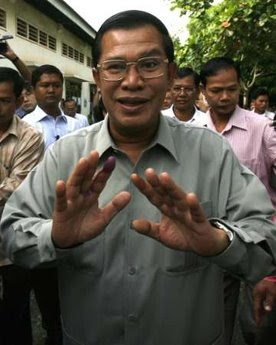asiaone News
Sun, Jul 27, 2008AFP
BANGKOK, THAILAND - THAILAND'S new foreign minister will face a tough challenge immediately after being sworn in Sunday, as he heads to Cambodia for talks on a tense border dispute that brought down his predecessor.
Incoming minister Tej Bunnag is determined to ease tensions with Cambodia, but his spokesman warned that a swift end to the military standoff near the ancient Preah Vihear temple was unlikely.
'The minister said he will try his best to talk to the Cambodia foreign minister', the spokesman, Mr Tharit Charungvat, told reporters on Sunday.
'It is his first task - we hope we can find a solution on some level, but this issue is sensitive and complex'.
Mr Tej, 64, will be sworn in by the king later Sunday. He will then travel early Monday to Siem Reap in northwest Cambodia for negotiations with his counterpart, Mr Hor Namhong.
'The sensitive and complicated discussion on Monday will definitely need more rounds of talks ... The boundary is a very important and complex issue and it needs time to solve, step by step and slowly', Mr Tharit said.
Thousands of Thai and Cambodia troops are currently stationed in 4.6 square kilometres of disputed land near Preah Vihear, which was granted UN World Heritage Status this month.
Thailand initially supported Cambodia's bid to have the 11th century Hindu ruins recognised by the UN, but nationalists and anti-government protesters said the move jeopardised Thai sovereignty.
The Constitutional Court ruled that previous foreign minister Noppadon Pattama and the cabinet should have sought parliamentary approval for the deal with Cambodia over the temple, and Mr Noppadon was forced to resign on July 10.
Mr Tharit said that Mr Tej - a British-educated career diplomat who has worked as an advisor to the king - was well qualified to negotiate with Cambodia at a sensitive moment in their relations.
'He is an experienced diplomat and he was chairman of the Thailand-Cambodia Cultural Committee', he said.
Talks between Thailand's head of the armed forces General Boonsrang Niumpradit and Cambodia Defence Minister Tea Banh ended last Monday without resolution, with neither side backing down on their territorial claims.
The International Court of Justice ruled in 1962 that the Preah Vihear temple belongs to Cambodia, but surrounding land remains in dispute. -- AFP
Sun, Jul 27, 2008AFP
BANGKOK, THAILAND - THAILAND'S new foreign minister will face a tough challenge immediately after being sworn in Sunday, as he heads to Cambodia for talks on a tense border dispute that brought down his predecessor.
Incoming minister Tej Bunnag is determined to ease tensions with Cambodia, but his spokesman warned that a swift end to the military standoff near the ancient Preah Vihear temple was unlikely.
'The minister said he will try his best to talk to the Cambodia foreign minister', the spokesman, Mr Tharit Charungvat, told reporters on Sunday.
'It is his first task - we hope we can find a solution on some level, but this issue is sensitive and complex'.
Mr Tej, 64, will be sworn in by the king later Sunday. He will then travel early Monday to Siem Reap in northwest Cambodia for negotiations with his counterpart, Mr Hor Namhong.
'The sensitive and complicated discussion on Monday will definitely need more rounds of talks ... The boundary is a very important and complex issue and it needs time to solve, step by step and slowly', Mr Tharit said.
Thousands of Thai and Cambodia troops are currently stationed in 4.6 square kilometres of disputed land near Preah Vihear, which was granted UN World Heritage Status this month.
Thailand initially supported Cambodia's bid to have the 11th century Hindu ruins recognised by the UN, but nationalists and anti-government protesters said the move jeopardised Thai sovereignty.
The Constitutional Court ruled that previous foreign minister Noppadon Pattama and the cabinet should have sought parliamentary approval for the deal with Cambodia over the temple, and Mr Noppadon was forced to resign on July 10.
Mr Tharit said that Mr Tej - a British-educated career diplomat who has worked as an advisor to the king - was well qualified to negotiate with Cambodia at a sensitive moment in their relations.
'He is an experienced diplomat and he was chairman of the Thailand-Cambodia Cultural Committee', he said.
Talks between Thailand's head of the armed forces General Boonsrang Niumpradit and Cambodia Defence Minister Tea Banh ended last Monday without resolution, with neither side backing down on their territorial claims.
The International Court of Justice ruled in 1962 that the Preah Vihear temple belongs to Cambodia, but surrounding land remains in dispute. -- AFP




































